‘Love Actually’ is a holiday must-watch for many — but these subplots haven’t aged well
- Oops!Something went wrong.Please try again later.
- Oops!Something went wrong.Please try again later.
- Oops!Something went wrong.Please try again later.
- Oops!Something went wrong.Please try again later.
According to almost every beloved romantic comedy ever — and even some not-so-beloved ones — romance and the holiday season go hand-in-hand.
That has to be the reason for the myriad of holiday-themed romantic comedies, from cult favorites like “The Holiday” and Netflix efforts like “The Knight before Christmas.”
And then, there’s “Love Actually,” Richard Curtis’ 2003 directorial debut, fresh off the success of writing hits like “Notting Hill” and “Bridget Jones’s Diary.” Though the film received mixed reviews upon its release, “Love Actually” has since cemented itself in the holiday romantic comedy canon — so much so that a newly restored 4K version of the movie was just re-released for home entertainment and is returning to some theaters for its 20th anniversary.
“Love Actually” is an expansive story — with nine different subplots crammed into 2 hours, 15 minutes, exploring love in all its varying forms. There’s a maybe-adulterous husband, a lonely writer, a grieving widower, an unlucky-in-love idiot, a washed-up rockstar, a yearning prime minister, and what feel like dozens more stereotypical tropes — all fumbling through this journey of love against the backdrop of a snowy Christmas season.
But the film itself has become increasingly scrutinized, drawing criticism for its humor (the fat jokes are relentless) and its minimization of female characters.
Writing in 2013, Lindy West, author of “Shrill: Notes from a Loud Woman” which was later adapted into a Hulu series, said: “Love Actually’s central moral lesson: The less a woman talks, the more lovable she is.”
“This entire movie is just straight white men acting upon women they think they ‘deserve,’” West writes. “This entire movie is just men doing things.”
Still, the film has remained essential viewing for many people, particularly those who grew up with it. And there are delightful moments to be found in the movie, which seem to encapsulate the entire point: love, actually, is all around us.
But 20 years later after the film’s initial release, some of the film feels outdated, something Curtis himself addressed last year.
“There are things that you would change,” he said. “But thank God society is changing. My film is bound in some moments to feel out of date. The lack of diversity makes me feel uncomfortable and a bit stupid.”
In honor of the film’s 20th anniversary and re-release, here are its most brow-raising, wince-inducing, hands-to-face moments.
Colin’s entire plotline
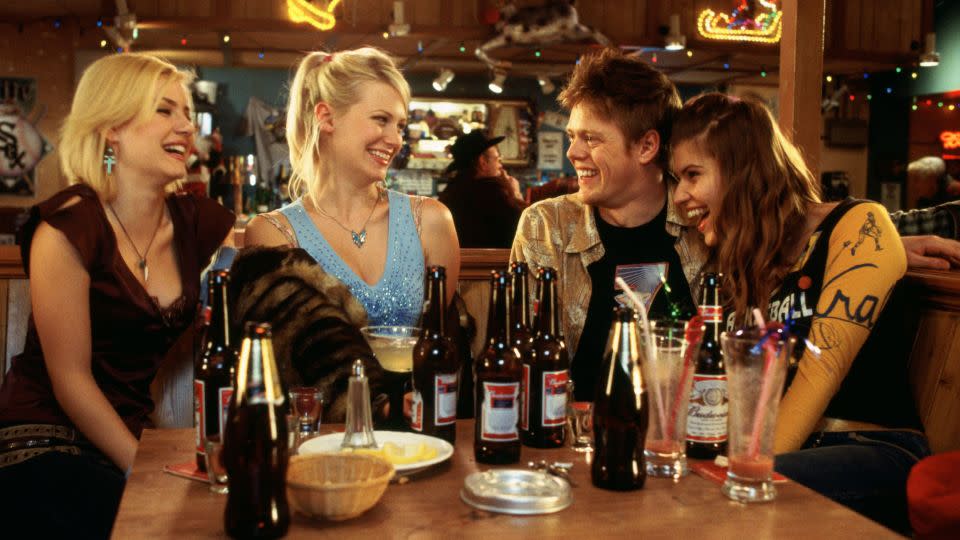
Colin, played by Kris Marshall, is first introduced to audiences during the title sequence. One of his first lines is said while delivering breakfast to women in an office building: “Try my lovely nuts?” he quips, with a wry smile. To another woman, he follows up with: “Morning, my future wife.”
Those two lines alone are enough to make any movie watcher cringe. And yet, there’s more. Colin is frustrated, claiming British women are too hard to please, so he goes off to the US where apparently the women will be so charmed by his English accent he won’t have to work. We wish there was more of his story to divulge, but that’s all there is to it.
At the end of the movie, we see him land at a bar in Milwaukee, and later bring a tall blonde woman home to England. We learn nothing else about either character, beyond he’s horny and she likes British accents.
Juliet kissing her husband’s best friend
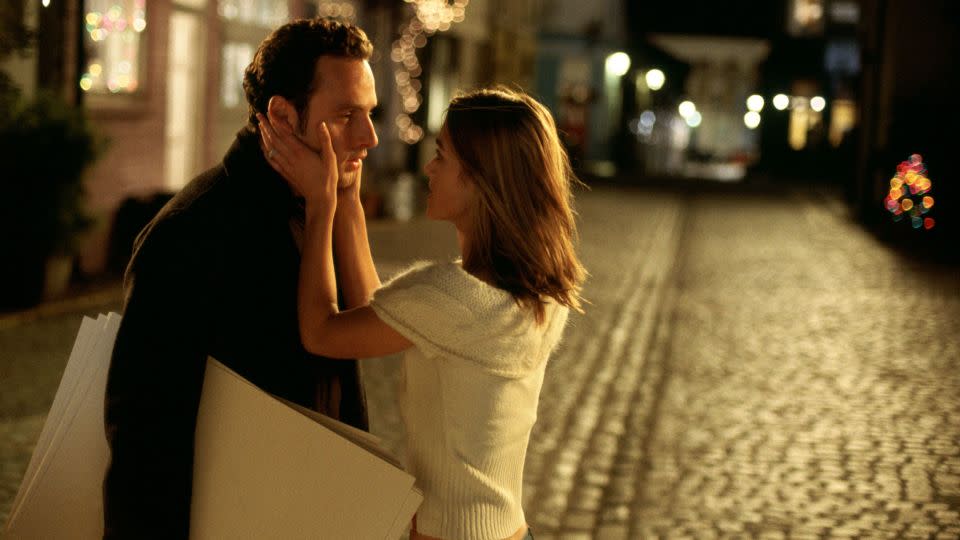
At the very beginning of the movie, we see Juliet (Keira Knightley) wed Peter (Chiwetel Ejiofor, one of the only actors of color in the movie). They seem very happy, and a band plays a rendition of The Beatles’ “All You Need Is Love.” They ride off into their happily ever after.
But then, unspeakably, Peter’s best man, Mark (Andrew Lincoln), intercedes. After seeing a wedding video Mark made that consists entirely of creepy close-ups of Juliet’s face, Juliet realizes Mark has been in love with her — despite treating her with the type of contempt usually wielded by an angry in-law. (“But, you never talk to me,” she says. “You don’t like me.”) And we, the audience, also do not really know why he suddenly seems to love her after she marries his best mate, or why he needed to be such a weirdo about it.
This all culminates in the iconic scene where he shows up at her door with notecards, basically professing his love for her. In theory, and perhaps at the time, this gesture was meant to be romantic. But what type of person goes after his best friend’s wife and tells her he loves her, especially after making a serial-killer-esque movie dedicated to her?
That would be cringey enough. And yet for some reason, as he walks off, Juliet chases him out the door (have some shame, girl!) and kisses him, eyes fluttering and full of lust.
Then she runs back inside, returning to her husband (the loving Peter, from whom we have not seen or heard since the wedding). We never know whether he finds out about this utter betrayal of trust, apparently all in the spirit of the season, despite Mark proclaiming “On Christmas, you tell the truth.” Bah humbug.
‘Who do you have to screw around here to get a chocolate biscuit?’ says the prime minister
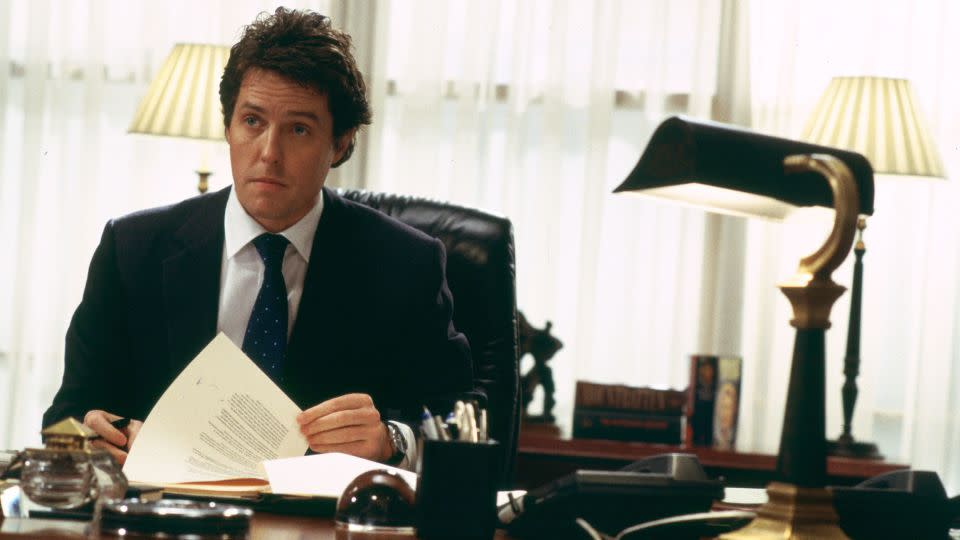
Ah yes, a powerful world leader (Hugh Grant) talking about screwing someone for a chocolate cookie. The line is enough to elicit a wince, but then of course Natalie (Martine McCutcheon) walks in and it dawns on everyone that, yes, she is the person you’d have to screw.
Though the actual nature of their courtship is an HR nightmare (as many rom-com relationships are, to be fair), there is another moment, later, when the prime minister’s secretary refers to Natalie as “the chubby girl” with “huge thighs.” Unfortunately, this is not the only fat joke leveled at Natalie’s expense.
But this particular one occurs as the most powerful elected official in England is attempting to ask if the secretary can fire Natalie, because apparently he cannot stop thinking about her “huge thighs.” Note that Natalie has done nothing wrong here aside from simply existing.
Somehow, after she leaves the job, these two end up together.
Jamie Bennett proposing to Aurélia
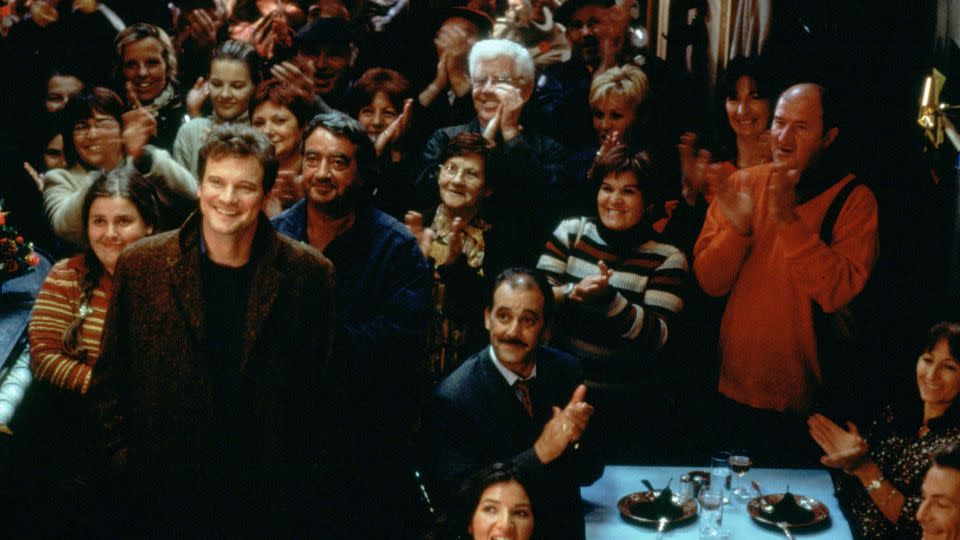
When Colin Firth’s character proposes to Lúcia Moniz’s character, it’s meant to be a moment of triumph. He shows up at her house, speaking stilted Portuguese, and they lead her to her current job, where she is literally working, and he proposes — still in broken Portuguese. Everyone cheers.
This might be sweet if not for the fact that the two characters met when Jamie could not speak Portuguese, and Aurélia could not speak English. They communicated in eyebrow raises and sly glances. That may be enough for a one night stand, but a marriage?
He then goes off on his own, learns this language, returns and proposes. What’s wrong with dinner and a movie? And it’s still not exactly clear why they like each other. They couldn’t even hold a conversation!
Sarah being shamed for choosing her brother over a hook-up
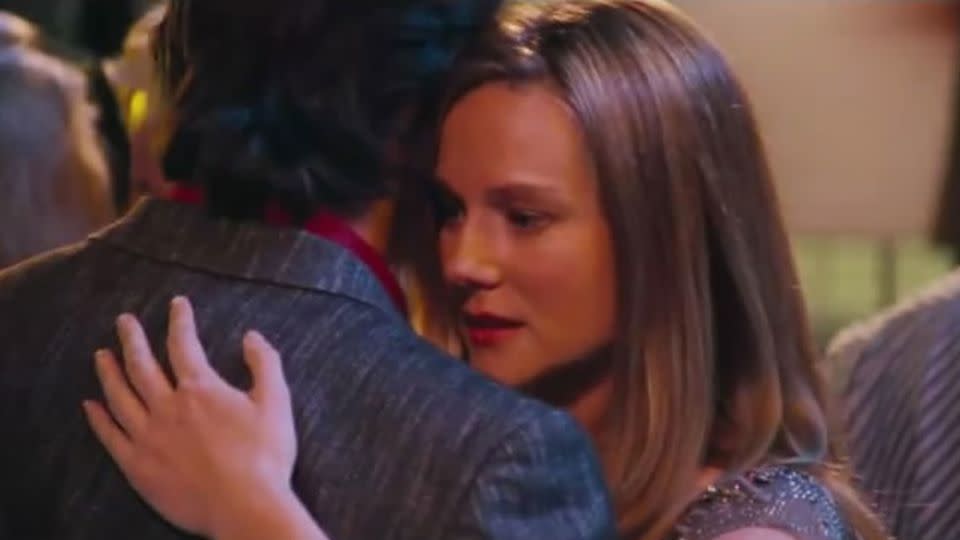
Sarah, played by Laura Linney, is in love with Karl, played by Rodrigo Santoro, the creative director at the graphic design firm at which she works. She’s seduced by his dark hair and sultry look, and suddenly the two are entangled in bed.
That’s when Michael, Sarah’s brother, who is hospitalized in a psychiatric ward, calls her phone. Sarah picks up, choosing her brother and his needs over her own.
It can be argued that this, too, is a type of romance. But by the end of the movie, Sarah is left partner-less, with a meek “Merry Christmas” from Karl to keep her company. Why couldn’t Karl understand her brother needed her? Why couldn’t Sarah have had both — why does she have to choose between her mentally ill brother and a handsome man?
These questions remain unanswered. It’s true not everyone gets a happily ever after. But the almost-sex scene between Sarah and Karl feels like Sarah is being punished for taking care of her brother, throwing a cold wrench between an otherwise sweet duo.
John clasping Judy’s breasts — albeit professionally

It’s for the “lighting,” the production assistant says, so the team knows “when we’re going to see the nipples.”
John, played by Martin Freeman, and Judy, played by Joanna Page, are stand-ins on a movie set, who meet while standing in for the sex scenes in a film. Which means that we, the audience, are subjected to John and Judy simulating sex while making intensely awkward small talk.
The juxtaposition does lead to some funny moments. But in this particular scene, Judy is instructed to take off her shirt, while John clasps her boobs from behind, warming his hands with his breath before doing so. “I promise I won’t look,” he says, as respectfully as he can given the situation. (Where is the intimacy coordinator!)
“And massage them, please,” an assistant says. Freeman looks briefly pained. (We all were.)
Despite all the chagrin, “Love Actually” persists partly as a relic of a time past, but also as a reminder of love at the holidays. Earlier this year, Variety noted that the film makes little sense, but that’s part of its charm.
“It is nuts, but real life is nuts,” wrote journalist Stephen Rodrick. “It is messy and full of freaks like Mark and Colin Frissell. There will always be good people like Sarah and Joe that give way more than they get. And yet we make our way through the Christmas parties and traffic at the Grove to make it home to the people we love, no matter how nuts they may be or own psychological damage. We save each other.”
Many people feel similarly, hence its re-release. Maybe that is the biggest lesson “Love Actually” teaches us: When you love something, you love it, warts and all.
For more CNN news and newsletters create an account at CNN.com

